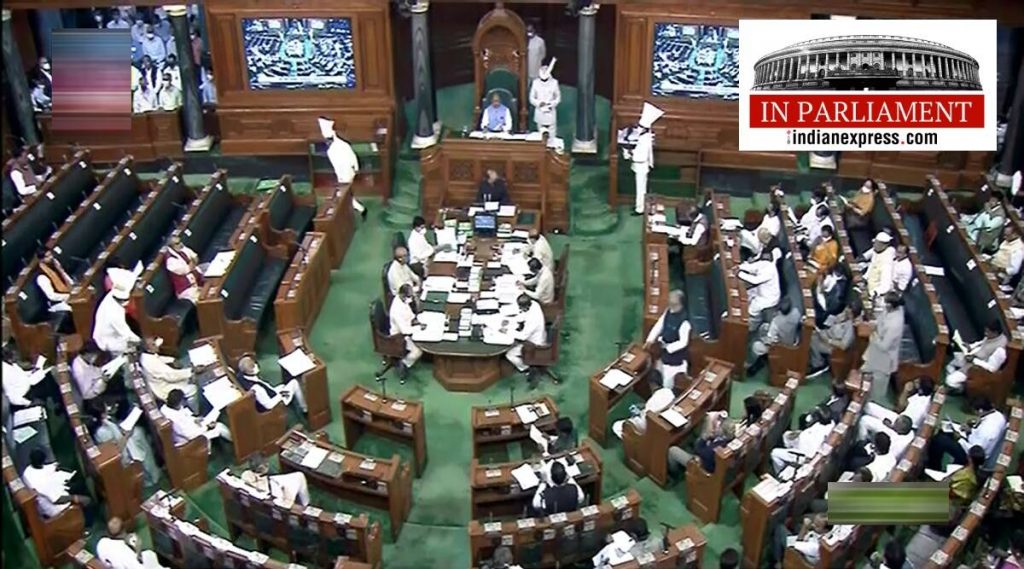BUSINESS LAW AND THE PARLIAMENT
By : Kumari Sunaina Intern at Fastrack Legal Solutions
Introduction:
Parliament, which is a platform to do a discussion on issues having social and civic importance
in any popular democracy, is a cornerstone of democratic values in any representative
democracy Parliament may be perceived as a political institution to ensure the realization of
what Mahatma Gandhi once envisaged that, Democracy essentially is the art and science of
mobilizing and utilizing the entire physical, economic and immaterial & Metaphysical resources
for the common good of all the people.
Business Law is also known as Commercial law or corporate law, is the body of law that applies
to the rights, relations, and conduct of persons and businesses engaged in commerce,
merchandising, trade, and sales. It is often considered to be a branch of civil law and deals with
issues of both private law and public law. The word ‘Law’ has been derived from the Teutonic
word ‘Lag, which means ‘definite’. On this basis Law can be defined as a definite rule of conduct
and human relations. It also means a uniform rule of conduct which is applicable equally to all
the people of the State. Law prescribes and regulates general conditions of human activity in
the state.
Though the origin of the concept of Parliament traces to European nations since medieval ages,
it has been an indispensable part of the Indian democratic structure since the inception of
democracy in India.
Meaning of Parliament :
The Parliament of India is the supreme legislative authority in the country and it is bicameral. It
is divided into two houses – the Rajya Sabha, which is the Council of States, and the Lok Sabha,
which is the House of the People.The Lok Sabha is referred to as the Lower house and the Rajya
Sabha is referred to as the Upper house. The members of the Parliament are either elected by
the people of India or nominated by the President of India.
The Legislature or Parliament is headed by the President of India. The term of Rajya Sabha is six
years (one-third of its members retire every two years and are replaced by newly elected
members) and the term of Lok Sabha is five years. The Lok Sabha can be dissolved. In Rajya
Sabha, 238 members are elected by the State and 12 members are nominated by the President
for their contribution in the fields of art, literature, science and social services. In Lok Sabha,
543 members are elected by the voting population of India and two Anglo Indians are elected
by the President of India. The Speaker, who is the Presiding Officer of the Lok Sabha, is elected
by its members. The Vice President of India, who is the ex-officio Chairman of Rajya Sabha, is
elected by the members of an electoral college consisting of the members of both the Houses
of Parliament.

Parliamentary Sessions:
The time between a House’s first sitting and its prorogation is a “session” of Parliament. The
time between a House’s prorogation and its final assembly in either a new session was known
as ‘Recess.’ Typically, three sessions are scheduled. The budget session lasts the longest, while
the winter session lasts the shortest. Budget Session is from February to May; the Monsoon
Session is from July to September, and Winter Session is from October to November.
Meaning of business law :
Business law is a body of rules, regulations, and principles that governs the activities of a
business. It includes concepts such as an organization’s fiduciary duty to shareholders, the legal
ways in which directors can be held accountable for their actions, and what constitutes a
breach of a contract.
Business law provides the framework through which businesses are run. The scope of business
law can be found in international treaties and domestic regulations. The United States is one of
the few countries that does not have any domestic regulation governing business law.
Elements of business law include contracts, agreements, and court proceedings. Business law
can be divided into two main categories:
1) Civil law – This consists of any laws that govern civil rights and obligations or any
regulations that affect civil rights and obligations. Examples of this include disputes
involving property, contracts, torts, debts, marriage relations.
2) Criminal law – This is any law that is used to prosecute someone who has committed a
crime as well as regulate other types of crime such as theft or fraud.
Examples of business law:
Every business owner needs to know how to navigate the legal landscape. Business law is a
broad and highly diverse field, with different sets of laws that apply depending on the type of
business or industry. This includes employment law, intellectual property law, contracts law,
and limited liability.
Also Read Decimalization of Section 377
Employment Law: The concept of employment is simple. You have an employee, hire a
company, and they work within the company’s premises for an agreed-upon amount of time.
An employer has the responsibility to provide a workplace that is safe and conducive for work,
as well as any benefits that are required by law.
Intellectual Property: Intellectual property refers to creations of human intellect such as new
products, ideas, or information that can be used without permission from their creator or
owner. A person can create an intellectual property by writing a book, designing a website,
designing a game, or designing clothes.
Contracts: Consumers often make use of contracts to protect their rights and interests in a
transaction. A contract is a legally binding agreement between two or more parties that
establishes the terms under which they will interact with each other. The terms can include the
rights and obligations that each party has in relation to one another, as well as any other
relevant information pertinent to their relationship. Contracts can vary widely in complexity
from a simple handshake agreement to an elaborate multi-page contract involving several
different parties and several different types of objects.
Limited Liability: A limited liability or an L.L.C. helps companies to increase their capital, invest
in risky projects and virtually create new ventures without incurring any financial risk. The
potential of lower risk may encourage companies or persons to invest in endeavors or start a
company. The most common types of L.L.C’s are partnerships, general partnerships, limited
partnerships, and corporations, but any business entity can be formed as an L.L.C.-such as an
LLC or a cooperative- if formed according to the law of the state where it was formed.
Rules for conduct of business :
Powers of Speaker under the Rules for the Conduct of Business:
Rule 378 of the Rules for the Conduct of Business states: “The Speaker shall preserve order and
shall have all powers necessary for the purpose of enforcing own decisions.”
Rule 373 says: “The Speaker, if is of the opinion that the conduct of any member is grossly
disorderly, may direct such member to withdraw immediately from the House, and any
member so ordered to withdraw shall do so forthwith and shall remain absent during the
remainder of the day’s sitting.”

For recalcitrant members, Rule 374 says:
The Speaker may, if deems it necessary, name a member who disregards the authority of the
Chair or abuses the rules of the House by persistently and wilfully obstructing the business
thereof.
If a member is so named by the Speaker, the Speaker shall, on a motion being made forthwith
put the question that the member (naming such member) be suspended from the service of the
House for a period not exceeding the remainder of the session: Provided that the House may,
at any time, on a motion being made, resolve that such suspension be terminated.
A member suspended under this rule shall forthwith withdraw from the precincts of the House.
Rule 374A:
Notwithstanding anything contained in rules 373 and 374, in the event of grave disorder
occasioned by a member coming into the well of the House or abusing the Rules of the House
persistently and wilfully obstructing its business by shouting slogans or otherwise, such
member shall, on being named by the Speaker, stand automatically suspended from the service
of the House for five consecutive sittings or the remainder of the session, whichever is less:
Provided that the House may, at any time, on a motion being made, resolve that such
suspension be terminated.
On the Speaker announcing the suspension under this rule, the member shall forthwith
withdraw from the precincts of the House.
The Constituent Assembly (Legislative) Rules of Procedure and Conduct of Business in force
immediately before the commencement of the Constitution of India were modified and
adopted by the Speaker of Lok Sabha in exercise of the powers conferred on him by article
118(2) of the Constitution and published under the title “”Rules of Procedure and Conduct of
Business in the House of the People”” in the Gazette of India Extraordinary dated the 17th April,
- Those Rules were amended by the Speaker from time to time on the recommendations
of the Rules Committee of the House until September, 1954. In September, 1954, Rules
Committee decided that their recommendations should be approved by the House before
amendments were given effect to. Consequently, the procedure for amendment of the rules as
given in rule 306 of the Fourth Edition (rule 331 of the Present edition) came into force with
effect from the 15th October, 1954.”
Conclusion :
Legislative proposals are brought before either house of the Parliament of India in the form of a
bill. A bill is the draft of a legislative proposal, which, when passed by both houses of Parliament
and assented to by the President, becomes an act of Parliament. Legislature is a kind of
assembly with the power to pass, amend and repeal laws. Statutory laws are the basic
framework of the modern legal system. Supreme legislation and subordinate legislation are two
types of the legislature Statute Law is the law made by Parliament. It is introduced in a Bill and,
if passed, becomes an Act.

